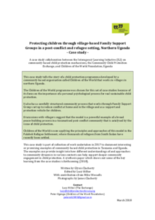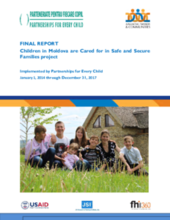Displaying 391 - 400 of 948
The objective of this study was to assess the impact of voluntary participation in an established statewide home-visiting program for socially high-risk families on child maltreatment as identified by Child Protective Services (CPS).
This webinar from Child Family Community Australia (CFCA) was recorded on 14 March 2018. It explored the implications of recent research on women's and children’s experiences of family violence and inter-parental conflict.
This article is an analysis of a State sponsored scheme in Rajasthan, the Palanhar Yojana, which has been successful in demonstrating the success of the scheme as an instrument of family strengthening.
This article describes the results of a scoping review to better understand child welfare professionals' and service users' (families' and children's) perspectives on and experiences with family engagement in the child protection system.
This study utilizes self-report data from one kinship navigator federal demonstration project, which used a randomized control trial, to examine demographic characteristics for grandmothers under and over 55 years of age, whether grandmother caregivers (≥55 years) improve family resilience, social support, and caregiver self-efficacy, and which interventions improved outcomes for grandmothers (≥55 years).
The quantitative study presented here contributes knowledge regarding the attitude of professionals towards positive parenting and child participation in professional support of families that are under temporary protection, with the goal of reunification.
This quantitative study contributes knowledge regarding the attitude of professionals towards positive parenting and child participation.
This study aims to give voice to parents and gather their views about contact visits in foster care.
This case study tells the story of a child protection programme developed by a community-based organisation called Children of the World that works in villages in northern Uganda.
This final report presents key learning, findings, and results of the “Children in Moldova are Cared for in Safe and Secure Families” (Children in Moldova) project.


